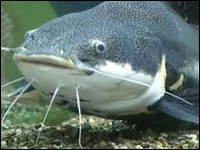 When the Canadian fishing industry first established its live cod exports to SE Asia, the fishing companies encountered an unexpected problem which threatened to derail the viability of their business.
When the Canadian fishing industry first established its live cod exports to SE Asia, the fishing companies encountered an unexpected problem which threatened to derail the viability of their business.
They had started sending the live cod in big water tanks onboard ships but the cod’s inactivity in the tanks over the long journey resulted in them developing very soft and mushy flesh. By the time they reached their destination they were not what their Asian customers had ordered.
To counter the problem, the companies put catfish in the tanks with the cod. The catfish kept nipping at the cod and agitating them throughout the journey keeping them active and ensuring the quality of the fish.
We are catfish. We are there to agitate. To agitate for the family.
Wherever we are – in the workplace, in the community, in the classroom, in the courtroom, in the media, in the church, and especially in the parliament, our aim is to agitate and keep people on their toes.
As a Party, we are on track for the forthcoming SA State election in March with our key Lower House candidates now in place.
High on our nipping list will be to do those things which strengthen the family – economically and socially.
My late father used to say, “When poverty comes in the door, love goes out through the window”. In Australia today, one of the biggest causes of marriage stress is financial pressure – employment uncertainty, ridiculously high mortgages forcing both parents out to work, the high cost of educating and raising children, high power prices, high water prices – you name it.
Social ills caused by the rupturing of family relationships – divorce, de-facto relationships, fatherless households, single mothers bringing up children – lead to a breakdown in society. Family breakdown is costly.
We have quoted these figures before, but mental illness costs the Australian economy $180bn a year. More than 3,000 Australians take their own lives each year. Boys raised in father-absent environments are twenty times more likely to end up in a correctional facility. Addiction to alcohol, gambling, drugs and pornography are rampant.
Then there’s social media.
There is an indisputable link between mental health and social media. Violent computer games affect boys. Cyber bullying has turned deadly for girls. Sexting is rife. Online sexual predators are pervasive.
So how to respond to this new threat to family life? Do we try to control it or do we try to inoculate people against its effects?
Things are changing so profoundly – in social attitudes, world economics, and especially technology – that politicians and bureaucrats seem ill-equipped to manage them.
One institution which can do a lot to help combat the lawlessness of the digital jungle and its predators is the family. The family is the ideal place to teach about relationships, learning who to trust, who not to trust, who to communicate with, and who not to communicate with.
If we are not the catfish, someone else will be – and the results will not be pleasant.